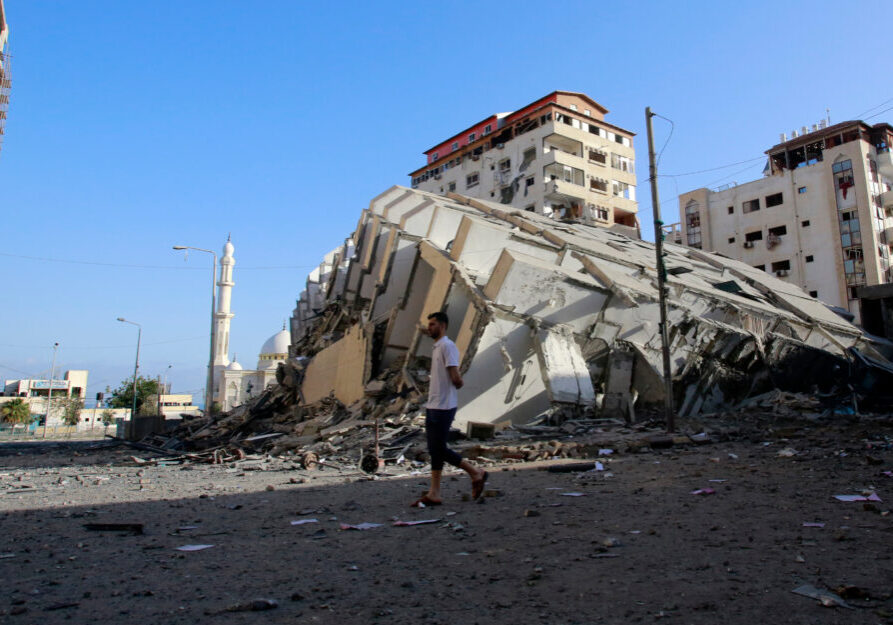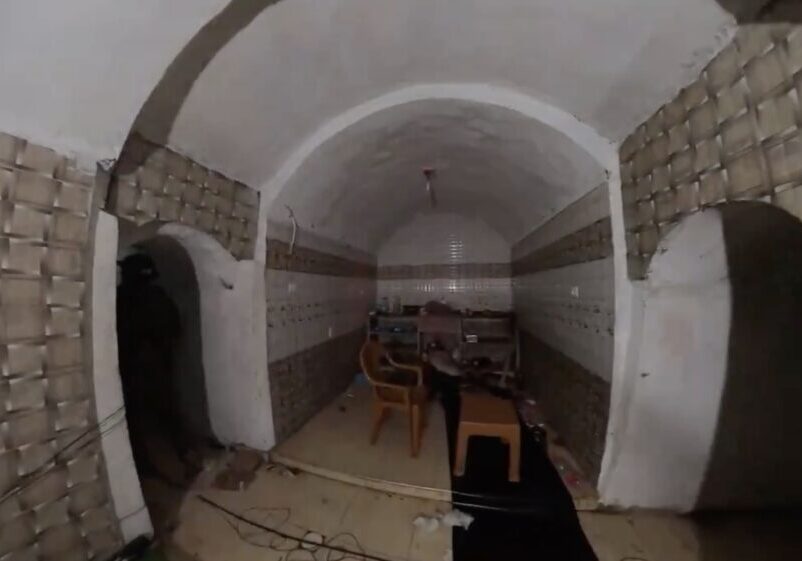Australia/Israel Review
A Town Called Sderot
Mar 1, 2010 | Andrew Friedman
One year later
By Andrew Friedman
Local and international media made much ado about the one-year anniversary of Operation Cast Lead, Israel’s military operation over December 2008 and January 2009 in the Gaza Strip to suppress Qassam rocket fire at Israeli civilians. But residents of Sderot, the Israeli town just three kilometres from the Gaza border, say they can’t understand what all the excitement is about.
“Post-traumatic stress disorder? Not here,” says Dr. Adrianna Katz, Executive Director of the Sderot Community Centre for Mental Health and of the Dachak emergency room for patients suffering emotional trauma and other emergency psychological conditions. “We’ve had more than 300 Qassam attacks since the ‘ceasefire’ – nearly one a day – and there are Colour Red sirens all the time.
“More than half the residents of Sderot continue to suffer from chronic shock and trauma conditions, exacerbated by the firm belief that the current, relative calm is only temporary. We’re dealing with all the problems you’d expect – bedwetting, chronic fear, insecurity, marital dysfunction and more. The constant fear affects parents as well, our social workers and psychologists are dealing with many cases of spousal friction, and that’s another factor that has an affect on the culture, especially on young people. So don’t talk to me about ‘post’-traumatic stress conditions in Sderot,” she told the Australia/Israel Review. “There is nothing ‘post’ about the stress people here are going through.”
Life Under the Gun
But despite this reality of ongoing rockets, on the ground in Sderot, signs of life are slowly returning. As opposed to the last time I visited the city, in January 2008, the town is no longer a ghost town. The main avenue into town is lined with small bomb shelters, called miguniot in Hebrew, as are the outdoor market, a large public park, the basketball court of a public high school and other public places.
But people are out-and-about. On a Thursday afternoon that I visited, teenagers joked and horsed around as they walked home from school, not unlike students from any Australian public school. The main shopping centre wasn’t exactly bustling, but there were people milling around, waiting calmly in line for the ATM, shopping and living their lives. That was not the case two years ago.
Life under the gun has made locals reticent to open up to strangers. Several individuals on the street refused to be interviewed for this story, and the people who agreed to talk on the record asked not to be photographed. This is part machismo – a “stiff upper lip” ethic is strong in this working class part of the world, but it is also partly due to a strong feeling that residents of the south have been abandoned, both by a political echelon that they say failed to “finish the job” in Gaza and by international media and NGOs who regularly describe the damage in Gaza in great detail but rarely address the deep wounds sustained by Israeli civilians in Sderot, Netivot, Kibbutz Nir Am, Ashkelon and other communities in the Gaza Belt region.
More than that, one gets a strong sense that the rockets have created a rock-solid bond amongst the people of Sderot, a fraternity of fear that outsiders can sympathise with but will never truly understand. Although people claim to have “gotten used to” the constant sirens and Qassam explosions, their eyes tell a different story: One man, Meir Azran, a 44-year-old father of three teenage daughters and the owner of a shoe store in downtown Sderot, said that after eight years he barely thinks about the sirens anymore. But his words are accompanied by a deep sadness and resignation. When asked about the future, he can only shrug his shoulders.
Eleven-year-old Natan A., from nearby Moshav Yachini, appeared to have developed better emotional tools to deal with the rockets. (This is not surprising. Psychologists and school counsellors say younger children are more likely to “deal” with ongoing fear than their older siblings or their parents. This is especially true in Sderot, where nine-year-old children have never known a Qassam-free reality.)
Like Azran, Natan told the Australia/Israel Review he has gotten used to running for the bomb shelter or simply diving under a table if there’s an incoming missile.
“I don’t know [how we deal with the situation],” Natan said with a shy grin. “When we’re in school, we get under our desks, we all sing songs together, and pray that the Qassam doesn’t come anywhere near us. That’s just the way it is.”
Ceasefire with Missiles
Out of Qassam range, Operation Cast Lead is very much out-of-mind for most Israelis. Israel’s economy is thriving, due in large part to advances in information technology, hi-tech, water conservation and renewable energy. The real estate crash that has hurt the US economy has had little impact on Israeli housing prices. As a result of that, and also of the fact that after four major wars, two intifadas and countless smaller skirmishes since declaring independence in 1948, the month-long battle with Hamas terrorists in Gaza in which 13 Israelis (ten soldiers, three civilians) and over 1,000 Palestinians died (mostly armed combatants according to Israeli sources) is currently far from the centre of national consciousness, especially as it recedes into history.
Government and military officials and independent analysts are split about the war’s outcome and the likelihood of whether Cast Lead was only Round One of a larger, more painful round of fighting.
In early November, IDF Chief of Staff Gabi Ashkenazi warned that Israel is prepared to renew combat in the Strip if need be, and later that month intelligence officials reported that weapons smuggling into Gaza had resumed immediately following the conflict last year. More recently, Mark Regev, the Australian-born spokesman for both current Prime Minister Binyamin Netanyahu and former PM Ehud Olmert, warned that “if Hamas causes another escalation, I believe Israel will be ready to act in a way that will decisively change the strategic equation.”
That may be easier said than done. The conflict does not appear to have dented Hamas’ stranglehold on the Gaza Strip, and Israeli intelligence officials say that Hamas has expanded upon its pre-war arsenal. Gen. Amos Yadlin, the head of Israel’s military intelligence services, says that Hamas has now acquired advanced Grad missiles capable of reaching Tel Aviv, and potentially, 80% of Israel’s population.
Postive Developments
If the situation in Gaza remains “fragile”, as Mark Regev says, many analysts say the situation in the West Bank has stabilised since Cast Lead. There, the fear of an imminent Hamas takeover has abated, thanks in large part to effective security cooperation between the Fatah-dominated Palestinian Authority and Israeli security forces. In Nablus, Jenin, Kalkilya and other Arab cities, PA forces work hard to prevent Hamas from surfacing, aided by IDF troops who operate freely and with the agreement of PA Chairman Mahmoud Abbas, despite occasional protests for public consumption.
Israeli observers say the security cooperation is the main reason there has been a sharp drop in terror activity from the West Bank, but they hasten to add that the are under no false impressions.
“Why do you think they aren’t bombing Kfar Saba from Kalkilya?” asks retired IDF General Yaakov Amidror, a former commander of the IDF’s National Defence College and the former head of the IDF’s Research and Assessment Division (citing two towns facing each other across the green line). “It’s not because they’ve grown to love us, or because the PA is fighting terrorism. It’s because our forces operate with a free hand there. Fatah members are deathly afraid that Hamas will do to them what they did to their comrades in Gaza, so they have no choice but to allow IDF forces to operate in the West Bank cities. As soon as Israel pulls out, Hamas will settle scores with them. It might take three weeks or three months or six months, but eventually it would happen,” he said.
Amidror’s warning recalls Hamas’ takeover of Gaza in 2006, and the situation during and after Operation Cast Lead, when Hamas members were reported to have mutilated and massacred Fatah members or their families.
The extended period of calm in the West Bank has lead to a modest economic revival in Nablus and Ramallah and other quarters of the region. This provides a boost for Prime Minister Netanyahu’s proposed policy of an “economic peace” with the PA, which sees economic development in Palestinian society as necessary to create the conditions for a political resolution. In early November, Palestinian entrepreneur Bashar Masri announced plans for a new planned city near Ramallah, and the Qatari telecommunications group Wataniya introduced a US$240 million telecommunications investment in the PA, the first instalment of a ten-year investment plan that is expected to create 2,000 jobs in the near-to-medium term. Throughout the past year, reports have surfaced about much improved shopping and cultural life in Palestinian cities, and Bethlehem merchants said the recent Christmas holiday period was the best tourist season there in years.
Goldstone Report
On the international stage, Israel’s standing post-Cast Lead is mixed. Anti-Israel groups in Europe continue to use “lawfare” to hound Israeli officials on diplomatic missions abroad, and protesters are able to draw publicity with protests over anything remotely connected to Israel – even tennis tournaments in which one of the participants is Israeli.
But there are also positive signs. Jacob Dayan, Israel’s Consul General in Los Angeles, says there is a small, but vocal, minority in America that supports Hamas, but he believes that a large majority of American taxpayers and elected officials stand firmly behind Israel’s attempt to rein in the rockets. He says that Congress is overwhelmingly supportive of Israel’s right to defend itself and supported Operation Cast Lead.
That’s true even in Europe, says Mark Regev. He points to a solidarity visit by the leaders of Great Britain, France, Germany, Italy and the Czech Republic on the last day of Cast Lead to illustrate his point. “Even at a time when many people (in Europe) were critical of Israel’s ‘disproportionate’ response to Hamas attacks, they came to the Prime Minister’s residence in Jerusalem to express their solidarity with Israel. The fact remains that amongst political elites and decision makers in Europe and the United States, there was broad understanding of Israel actions. They appreciated that Israel was left with no choice,” says Regev.
Still, Regev admits that Israel faces tough challenges today, primarily from the Goldstone Report, which he calls “a travesty,” but he dismisses the legitimacy of the report in total.
“We shouldn’t be surprised that the UN Human Rights Council – which is dominated by countries with atrocious human rights records – endorsed the report, but when it was delivered to the General Assembly, an overwhelming majority of democratic nations refused to support it. Syria and Sudan endorsed the report; Canada and Holland rejected it. That says a lot about the report,” he said.
Tags: Israel






